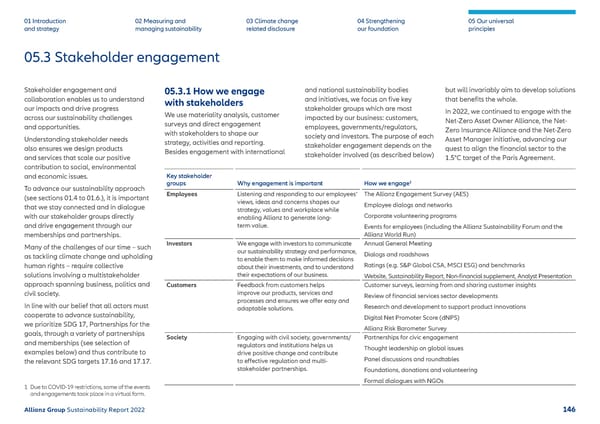01 Introduction and strategy 02 Measuring and managing sustainability 03 Climate change related disclosure 04 Strengthening our foundation 05 Our universal principles 05.3 Stakeholder engagement Stakeholder engagement and collaboration enables us to understand our impacts and drive progress across our sustainability challenges and opportunities. Understanding stakeholder needs also ensures we design products and services that scale our positive contribution to social, environmental and economic issues. To advance our sustainability approach (see sections 01.4 to 01.6 .), it is important that we stay connected and in dialogue with our stakeholder groups directly and drive engagement through our memberships and partnerships. Many of the challenges of our time – such as tackling climate change and upholding human rights – require collective solutions involving a multistakeholder approach spanning business, politics and civil society. In line with our belief that all actors must cooperate to advance sustainability, we prioritize SDG 17, Partnerships for the goals, through a variety of partnerships and memberships (see selection of examples below) and thus contribute to the relevant SDG targets 17.16 and 17.17. 05.3.1 How we engage with stakeholders We use materiality analysis, customer surveys and direct engagement with stakeholders to shape our strategy, activities and reporting. Besides engagement with international and national sustainability bodies and initiatives, we focus on five key stakeholder groups which are most impacted by our business: customers, employees, governments/regulators, society and investors. The purpose of each stakeholder engagement depends on the stakeholder involved (as described below) but will invariably aim to develop solutions that benefits the whole. In 2022, we continued to engage with the Net-Zero Asset Owner Alliance, the Net- Zero Insurance Alliance and the Net-Zero Asset Manager initiative, advancing our quest to align the financial sector to the 1.5°C target of the Paris Agreement. Key stakeholder groups Why engagement is important How we engage 1 Employees Listening and responding to our employees’ views, ideas and concerns shapes our strategy, values and workplace while enabling Allianz to generate long- term value. The Allianz Engagement Survey (AES) Employee dialogs and networks Corporate volunteering programs Events for employees (including the Allianz Sustainability Forum and the Allianz World Run) Investors We engage with investors to communicate our sustainability strategy and performance, to enable them to make informed decisions about their investments, and to understand their expectations of our business. Annual General Meeting Dialogs and roadshows Ratings (e.g. S&P Global CSA, MSCI ESG) and benchmarks Website, Sustainability Report, Non-financial supplement, Analyst Presentation Customers Feedback from customers helps improve our products, services and processes and ensures we offer easy and adaptable solutions. Customer surveys, learning from and sharing customer insights Review of financial services sector developments Research and development to support product innovations Digital Net Promoter Score (dNPS) Allianz Risk Barometer Survey Society Engaging with civil society, governments/ regulators and institutions helps us drive positive change and contribute to effective regulation and multi- stakeholder partnerships. Partnerships for civic engagement Thought leadership on global issues Panel discussions and roundtables Foundations, donations and volunteering Formal dialogues with NGOs 1 Due to COVID-19 restrictions, some of the events and engagements took place in a virtual form. Allianz Group Sustainability Report 2022 146
 Sustainability Report 2022 | Allianz Page 146 Page 148
Sustainability Report 2022 | Allianz Page 146 Page 148